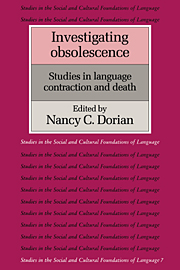Book contents
- Frontmatter
- Contents
- List of maps
- List of contributors
- Preface
- Map
- Dedication
- Introduction
- I Focus on context
- 1 On language death in eastern Africa
- 2 The disappearance of the Ugong in Thailand
- 3 Scottish and Irish Gaelic: The giant's bed-fellows
- 4 The rise and fall of an immigrant language: Norwegian in America
- 5 Breton vs. French: Language and the opposition of political, economic, social, and cultural values
- 6 “Persistence” or “tip” in Egyptian Nubian
- 7 Sociolinguistic creativity: Cape Breton Gaelic's linguistic “tip”
- 8 Skewed performance and full performance in language obsolescence: The case of an Albanian variety
- 9 On the social meaning of linguistic variability in language death situations: Variation in Newfoundland French
- 10 The social functions of relativization in obsolescent and non-obsolescent languages
- II Focus on structure
- III Invited commentaries
- Bibliography
- Index of languages
- General index
10 - The social functions of relativization in obsolescent and non-obsolescent languages
Published online by Cambridge University Press: 08 January 2010
- Frontmatter
- Contents
- List of maps
- List of contributors
- Preface
- Map
- Dedication
- Introduction
- I Focus on context
- 1 On language death in eastern Africa
- 2 The disappearance of the Ugong in Thailand
- 3 Scottish and Irish Gaelic: The giant's bed-fellows
- 4 The rise and fall of an immigrant language: Norwegian in America
- 5 Breton vs. French: Language and the opposition of political, economic, social, and cultural values
- 6 “Persistence” or “tip” in Egyptian Nubian
- 7 Sociolinguistic creativity: Cape Breton Gaelic's linguistic “tip”
- 8 Skewed performance and full performance in language obsolescence: The case of an Albanian variety
- 9 On the social meaning of linguistic variability in language death situations: Variation in Newfoundland French
- 10 The social functions of relativization in obsolescent and non-obsolescent languages
- II Focus on structure
- III Invited commentaries
- Bibliography
- Index of languages
- General index
Summary
Introduction
Reduction in the frequency of relative clauses in the usage of speakers in late stages of language death has been identified in languages of diverse genetic and typological affiliations: Cupeño and Luiseño (Hill 1973, 1978), Trinidad Bhojpuri (Durbin 1973), Tübatulabal (Voegelin and Voegelin 1977b), East Sutherland Gaelic (Dorian 1981, 1982b), and Dyirbal (Schmidt 1985c). Relative clauses, along with other complex sentence phenomena, have also been reported as absent in pidgin languages, developing only upon creolization of a pidgin (Sankoff and Brown 1976). Low frequencies of complex sentences have been identified also in working-class (as opposed to middle-class) usage in British English (Bernstein 1972), American English (Wolfram 1969), and French (Lindenfeld 1972). Van den Broeck (1977) identified the phenomenon in some speech contexts for working-class varieties of Flemish. A low rate of relativization in oral, as opposed to written, language in Western languages has also been frequently noted (see Chafe 1982). Romaine (1981) found lower rates of relativization associated with more intimate, as opposed to more formal, written styles of Middle Scots. The identification of a similar pattern of change or differentiation in such a variety of contexts challenges us to develop a unified functional explanation. Such an explanation would be new support for a widely shared intuition that the processes of change in language death are differentiated from ordinary change processes primarily by their rapidity (Dorian 1981; Schmidt 1985c).
Benveniste (1971) called relative clauses “syntactic adjectives” Foley (1980) has pointed out that they are the “most sentential” noun complements. Unlike adjectives, participles, and gerunds, relative clauses include tensed verbs.
- Type
- Chapter
- Information
- Investigating ObsolescenceStudies in Language Contraction and Death, pp. 149 - 164Publisher: Cambridge University PressPrint publication year: 1989
- 7
- Cited by



